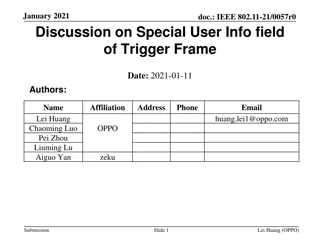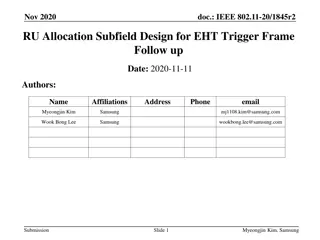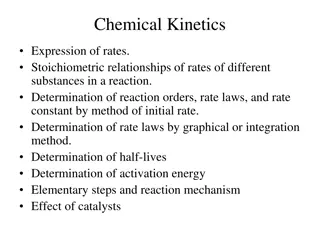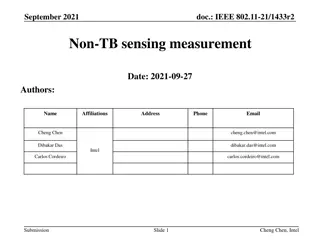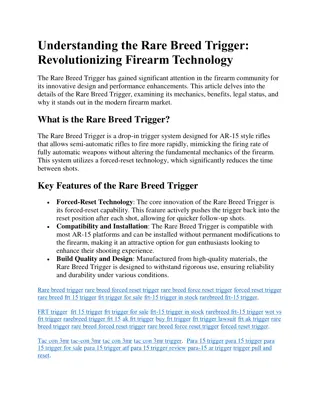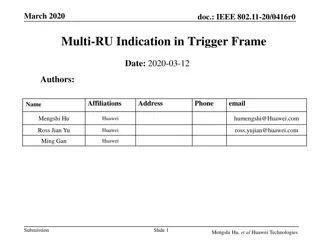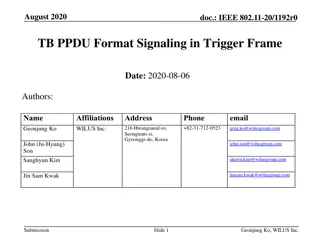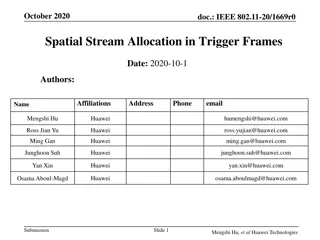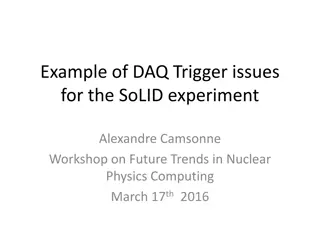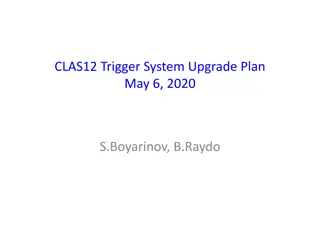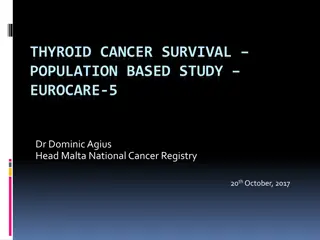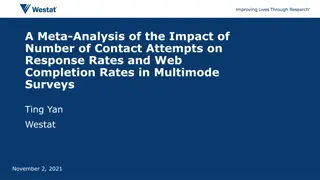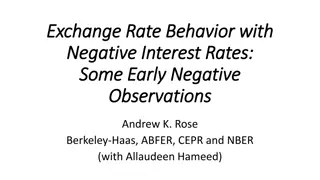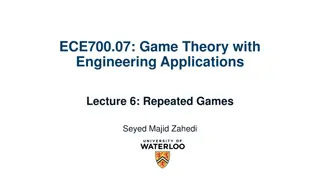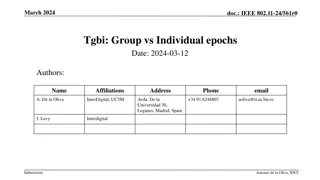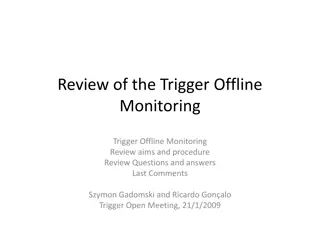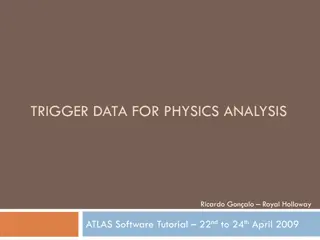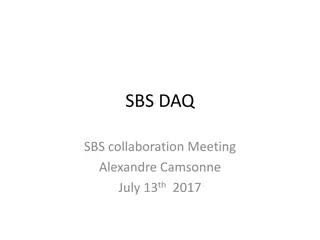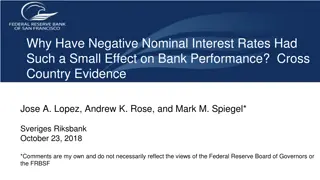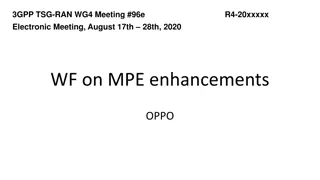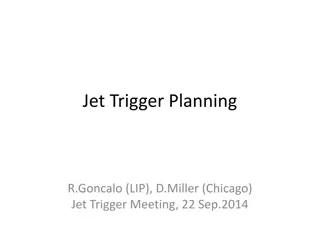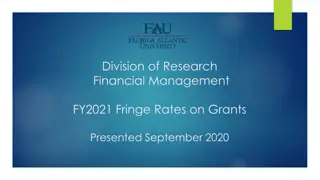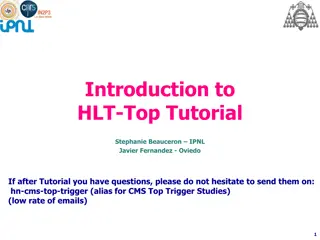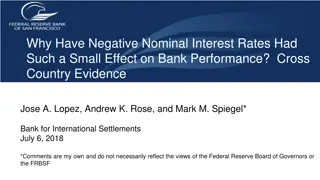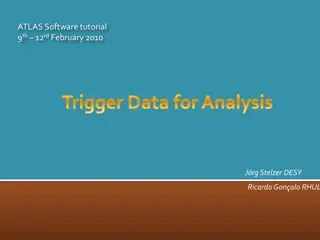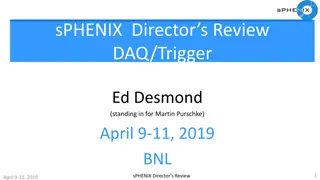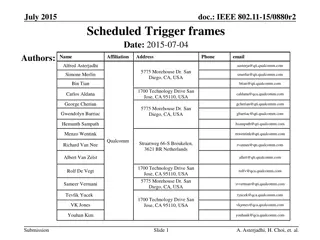Snaps and Hooks at Buckles International
Snap hooks, engineered with diverse specifications, offer multipurpose applicability and are available in various designs such as swivel snaps, bolt snaps, lobster snaps, claw clasp trigger snaps, and push trigger snaps.
0 views • 7 slides
IEEE 802.11-21/0057r0: Special User Info Field Discussion
The discussion revolves around the Special User Info field introduced in enhanced Trigger frames, detailing its main usages and implications in different frame types. There are proposals to optimize the structure of the MU-RTS Trigger frame by relocating certain subfields to reduce overhead and enha
0 views • 8 slides
Designing 9-Bit RU Allocation Subfield for EHT Trigger Frame in IEEE 802.11-20
IEEE 802.11-20/1845r2 presents a proposal for enhancing the RU allocation subfield design in the EHT Trigger frame to accommodate bandwidth support up to 320MHz and multiple RU or MRU allocations for UL MU transmissions in the 11be standard. The modification addresses inconsistencies in MRU mapping
0 views • 34 slides
Computation of Machine Hour Rate: Understanding MHR and Overhead Rates
Computation of Machine Hour Rate (MHR) involves determining the overhead cost of running a machine for one hour. The process includes dividing overheads into fixed and variable categories, calculating fixed overhead hourly rates, computing variable overhead rates, and summing up both for the final M
4 views • 18 slides
New Mexico Graduation Rates 2018-2019 Analysis
The New Mexico Public Education Department utilizes a Shared Accountability Model to calculate graduation rates, considering students' time enrolled at each school. Graduation rates are calculated after a two-step verification process, with on-time graduates in focus. Historical data shows a positiv
0 views • 13 slides
Understanding Chemical Kinetics: Rates, Reactions, and Mechanisms
Chemical kinetics involves studying reaction rates, rate laws, stoichiometry, and factors affecting reaction speed. This branch of chemistry delves into determining reaction orders, rate constants, and activation energies using various methods. Different types of rates, such as initial, instantaneou
2 views • 68 slides
Understanding Chemical Kinetics: Reaction Rates and Mechanisms
Chemical kinetics is a branch of chemistry focused on studying reaction rates and mechanisms. Unlike thermodynamics, which deals with feasibility, kinetics explores the speed at which reactions occur. Factors such as temperature, pressure, and catalysts influence reaction rates. Understanding the ra
3 views • 72 slides
Cancer Survival Rates in Europe: Trends and Disparities
Cancer survival rates in Europe have shown variations across different types of cancer and countries. While overall cancer mortality has increased over the years, some countries have experienced declines in mortality rates. Survival rates for breast cancer between 1995-2014 ranged from 74% to 89%, w
0 views • 17 slides
Comparison of Trigger-based vs. Non-Trigger-based Sensing Measurement in IEEE 802.11
The document discusses the differences between Trigger-based (TB) and Non-Trigger-based (Non-TB) sensing measurement instances in IEEE 802.11 standards, focusing on who initiates the sensing measurement. TB sensing is initiated by the AP, while Non-TB sensing is initiated by a non-AP STA, enabling o
6 views • 13 slides
RAREBREEDTRIGGERSTORE
The Rare Breed Trigger has gained significant attention in the firearm community for its innovative design and performance enhancements. This article delves into the details of the Rare Breed Trigger, examining its mechanics, benefits, legal status,
24 views • 3 slides
Multi-RU Indication in Trigger Frame for IEEE 802.11
This document discusses the concept of Multi-RU (Resource Unit) allocation in trigger frames for IEEE 802.11 standards, specifically focusing on the indication methods within trigger frames for improved spectral efficiency. The proposal suggests various options for indicating multiple RUs in trigger
0 views • 14 slides
IEEE 802.11-20/1192r0 TB PPDU Format Signaling in Trigger Frame
The document discusses the need for a clear rule to determine the TB PPDU format for MU operations in IEEE 802.11 standards. It proposes methods to indicate the TB PPDU format in Trigger frames to avoid conflicts between different station types. Various signaling methods are suggested to differentia
0 views • 14 slides
Spatial Stream Allocation in IEEE 802.11-20 Trigger Frames
The document discusses spatial stream allocation in IEEE 802.11-20 trigger frames, specifically focusing on the SS Allocation subfield. It explains how trigger frames allocate resources for TB PPDU transmissions and solicit User Info fields, detailing the RU Allocation and SS Allocation subfields. T
3 views • 15 slides
Understanding DAQ Trigger Issues in SoLID Experiment
Explore DAQ trigger challenges faced in the SoLID experiment through examples, including trigger goals, data readout specifics, and experiment setups. Learn about managing high luminosity, reducing data rates, improving signal quality, and handling bottleneck issues for effective data acquisition. D
0 views • 22 slides
Challenges and Solutions in Using EPICS for Digital DAQ Systems
Digital DAQ systems based on EPICS face issues with version control, data reading, trigger handling, and GUI consistency. Solutions involve code optimization, improving trigger management, and enhancing GUI design for better user experience.
2 views • 5 slides
CSC8503 Revision Lecture Overview - Exam Key Features and 2015/16 Exam Questions
Discussion of key features of the paper, review of last year's questions, exam details, and analysis of 2015/16 exam question 1. Detailed exploration of elements like Finite State Machines (FSM), states, transitions, trigger conditions, and specific details on the number of states, connections, and
2 views • 28 slides
CLAS12 Trigger System Upgrade Plan May 6, 2020
CLAS12 Trigger System is undergoing an upgrade to enhance trigger efficiency, purity, and data rate reduction. The existing hardware and trigger overview provide insight into the current system's components and operation. The upgrade goals aim to maintain high trigger efficiency, reduce data rates,
0 views • 14 slides
Thyroid Cancer Survival Trends in Europe: Eurocare-5 Study
A population-based study on thyroid cancer survival rates in Europe over 25 years reveals insights by sex, country, age, period, and histological type. The study shows increased incidence but stable mortality trends, with varying survival rates based on region, gender, and histology types like papil
0 views • 14 slides
Impact of Number of Contact Attempts on Response Rates in Multimode Surveys
This meta-analysis investigates the effects of the number of contact attempts on response rates and web completion rates in multimode surveys. Benefits of multimode surveys include improving coverage, increasing response rates, reducing costs, and enhancing measurement accuracy by utilizing multiple
0 views • 27 slides
Understanding Unit Rates in Mathematics
Explore the concept of unit rates in mathematics, where you will learn how to determine unit rates of given quantities and solve word problems involving unit rates. Discover key vocabulary, such as ratio, rate, and terms, and understand the difference between ratio and rates. Delve into examples and
0 views • 22 slides
Understanding Exchange Rate Behavior with Negative Interest Rates: Early Observations by Andrew K. Rose
In this study, Andrew K. Rose examines the exchange rate behavior in economies with negative nominal interest rates, focusing on the impact and implications of such rates on exchange rates. The findings suggest limited observable consequences on exchange rate behavior, with similarities in shocks dr
0 views • 42 slides
Game Theory with Engineering Applications: Repeated Games
Delve into the intricacies of repeated games in game theory, including finitely and infinitely repeated games with and without perfect monitoring, trigger strategies, and folk theorems. Explore the concept of subgame perfect equilibrium (SPE) in finitely repeated games through examples like the Pris
0 views • 27 slides
Discussion on IEEE 802.11 Group vs. Individual Epochs
Trigger discussion on differences between group and individual epochs in IEEE 802.11 standards. Group epochs involve simultaneous transitions of MAC parameters by all or selected STAs based on AP trigger, while individual epochs allow each STA to independently change its parameters. Key points inclu
0 views • 4 slides
Review of Trigger Offline Monitoring - Aims, Procedure, and Recommendations
The review of Trigger Offline Monitoring focuses on organizing shifts, improving documentation, and enhancing information flow. It outlines key questions and procedures to identify necessary improvements, formalize roles, and estimate resource needs. The review aims to optimize the monitoring infras
0 views • 18 slides
Understanding Age Adjustment in Disability Statistics
Explore the significance of age adjustment in disability statistics for creating comparable figures across countries. Learn about crude versus age-adjusted prevalence estimates and the importance of standardized rates for accurate comparisons in different populations. Discover the anatomy of rates,
0 views • 22 slides
Understanding Trigger Data Analysis in Physics: ATLAS Software Tutorial
This content provides detailed information on trigger data analysis for physics, focusing on ATLAS software tutorials conducted by Ricardo Gonçalo at Royal Holloway in April 2009. It covers features extraction algorithms, trigger configuration and data management, trigger-aware analysis, and the Tr
0 views • 26 slides
LV Trigger Cable Polish & EDH Order - Technical Details & Pricing
Explore technical specifications and pricing details of LV Trigger Cable Polish and EDH Order of August 2005. Uncover information on cable types, specifications, and pricing per meter for a 10km length. View images for a visual reference.
0 views • 5 slides
SoLID Collaboration Meeting Summary - June 8th, 2020
Outline of the SoLID collaboration meeting discussing DAQ requirements, trigger rates, infrastructure, and R&D items. Details on detector layouts and triggers for PVDIS and SIDIS, with information on SoLID requirements and associated risks. SoLID DAQ overview based on 12 GeV FADC electronics. Discus
0 views • 35 slides
SuperBigbite Collaboration Meeting Summary on DAQ and Electronics Progress
SuperBigbite collaboration meeting between Alexandre Camsonne and team took place on July 13th, 2017, discussing various topics such as data reduction, network upgrades, DAQ disks, and more. Detailed discussions on expected trigger rates, GEM occupancy, data rates, front tracker layout, and trackers
0 views • 31 slides
Impact of Negative Nominal Interest Rates on Bank Performance: Cross-Country Insights
Examining the effects of negative nominal interest rates on bank performance reveals challenges in maintaining profitability, with concerns around reduced interest rate margins and disruptions to monetary transmission mechanisms. Empirical evidence suggests a reluctance among banks to impose negativ
0 views • 43 slides
3GPP TSG-RAN-WG4 Meeting #96e Electronic Meeting August 17th-28th, 2020
This document discusses various topics related to PMPR reporting values, absolute and relative PMPR trigger thresholds, and the relationship between them. It covers agreements reached on defining reporting values, trigger thresholds, and configurations for event-triggered reporting scenarios within
0 views • 8 slides
Progress Report on Jet Trigger Planning and Monitoring Discussion
Highlights from a meeting discussing Jet Trigger Planning, Monitoring, Menu Evolution, and other related activities within the scientific community, emphasizing the need for strategic menu choices, migration to xAOD, menu awareness, full-scan implications, and ongoing software development efforts fo
0 views • 5 slides
FY21 Fringe Rates and Benefits Analysis for Research Grants
Explore the newly negotiated FY21 fringe rates for grants, historical comparisons, and the treatment of fringe benefits on grants per Uniform Guidance. The comprehensive analysis includes details on the increase in rates to recover deficits, benefits included in the fringe rates, and the process of
0 views • 14 slides
Understanding CMS High Level Trigger Tutorial
Dive into the world of CMS High-Level Trigger system with this tutorial covering topics such as trigger constraints, HLT menu/path, hardware and software components, decision processes, and event recording. Explore the functionality of Level 1 triggering, High-Level Trigger streams, and the intricat
0 views • 21 slides
Impact of Negative Nominal Interest Rates on Bank Performance
Negative nominal interest rates, implemented following the financial crisis, have had a limited effect on bank performance globally. While low rates reduce profitability, banks have shown resilience through adjustments in funding allocations and non-interest income sources. Studies suggest that resp
0 views • 34 slides
Optimal Early Drought Detection Using Stochastic Process
Explore an optimal stopping approach for early drought detection, focusing on setting trigger levels based on precipitation measures. The goal is to determine the best time to send humanitarian aid by maximizing expected rewards and minimizing expected costs through suitable gain/risk functions. Tas
0 views • 4 slides
Understanding ATLAS Software Tutorial on Trigger Data Analysis
This content delves into the significance and process of trigger data analysis in the context of ATLAS software tutorials. It covers topics such as Trigger Execution, Trigger Configuration, and Trigger-Aware Analysis, providing detailed insights into how triggers are configured, data is prepared, an
0 views • 37 slides
sPHENIX DAQ/Trigger System Overview
The sPHENIX DAQ/Trigger system is the focus of this review, covering the hardware, procurements, technical status, and deliverables of the system. Key components include Data Collection Modules (DCM-II), SubEvent Buffers (SEB), control machines, and global level 1 system. The system aims to achieve
0 views • 21 slides
Trigger Finger Treatment in Koramangala & Sarjapur Road, Bangalore_ Expert Care for Bone & Joint Health
If you're dealing with the discomfort of trigger finger, don't wait for the condition to worsen. Seeking prompt medical care from a bone and joint specialist in Koramangala or Sarjapur Road, Bangalore, will ensure that you receive the best treatment
1 views • 3 slides
IEEE 802.11-15/0880r2 Scheduled Trigger Frames - July 2015
This document from July 2015 discusses the IEEE 802.11-15/0880r2 Scheduled Trigger Frames, featuring various authors from Qualcomm, LG Electronics, Intel, Marvell, Broadcom, and Mediatek. The document includes multiple submission slides with contact information for the authors.
0 views • 17 slides

